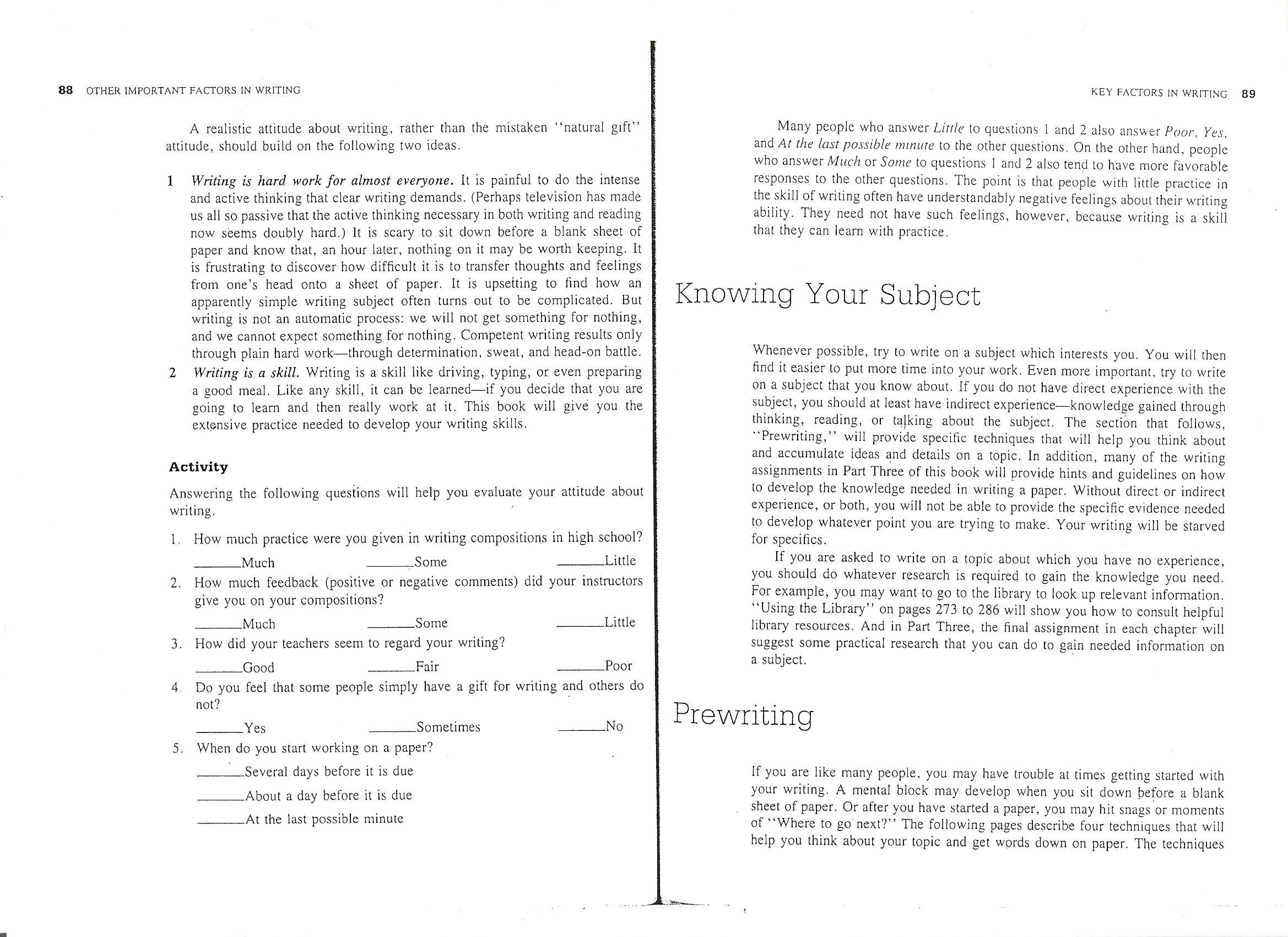88 89

88 OTHER 1MPORTANT FACTORS IN WRITING
A realistic attitude about writing, rather than the mistaken “natural gift” attitude, should build on the following two ideas.
1 Writing is hord work for almost everyone. It is painful to do the intense and active thinking that elear writing demands. (Perhaps television has madę us all so passive that the active thinking necessary in both writing and reading now seems doubly hard.) It is scary to sit down before a blank sheet of paper and know that, an hour later, nothing on it may be worth keeping. It is frustrating to discover how difficult it is to transfer thoughts and feelings from one’s head onto a sheet of paper. It iś upsetting to find how an apparently simple writing subject often tums out to be complicated. But writing is not ah autorńatic process: we will not get something for nothing, and we cannot expect something for nothing. Competent writing results only through plain hard work—through determination, sweat, and head-on battle.
2 Writing is a skill. Writing is a skill like driving, ty ping, or even preparing a good meal. Like any skill, it can be learned—if you decide that you are going to leam and then really work at it. This book will give you the extensive practice needed to develop your writing skills.
Activity
Answering the following ąuestions will help you evaluate your attitude about writing.
1. How much practice were you given in writing compositions in high school?
_Much __Some -Little
2. How much feedback (positive or negative comments) did your instructors give you on your compositions?
_Much _Some Little
3. How did your teachers seem to regard your writing?
_Good _-Fair _Poor
4. Do you feel that some people simply have a gift for writing and others do not?
-Yes _Sometimes -No
5. When do you start working on a paper?
-Several days before it is due
-About a day before it is due
--At the last possible minutę
Many people who answer Little to ąuestions 1 and 2 also answer Poor, Yes, and At the last possible minutę to the other questions. On the other hand, people who answer Much or Some to ąuestions 1 and 2 also tend to have morę favorab!e responses to the other ąuestions. The point is that people with little practice in the skill of writing often have understandably negati ve feelings about their writing ability. They need not have such feelings, however, because writing is a skill that they can leam with practice.
Knowing Your Subject
Whenever possible, try to write on a subject which interests you. You will then And it easier to put morę time into your work. Even morę important, try to write on a subject that you know about. If you do not have direct experience with the subject, you should at least have indirect experience—knowledge gained through thinking, reading, or tąlking about the subject. The section that follows, *‘Pre writing,” will provide specific techniąues that will help you think about and accumulate ideas and details on a topie. In addition, many of the writing assignments in Part Three of this book wili provide hints and guidelines on how to develop the knowledge needed in writing a paper. Without direct or indirect experience, or both, you will not be able to provide the specific evidence needed to develop whatever point you are trying to make. Your writing will be starved for spec i fi cs.
If you are asked to write on a topie about which you have no experience, you should do whatever research is reąuired to gain the knowledge you need. For example, you mąy want to go to the library to look up reievant information. “Using the Library” on pages 273 to 286 will show you how to consult helpful library resources. And in Part Three, the finał assignment in each chapter will suggest some practical research that you can do to gain needed information on a subject.
Prewriting
If you are like many people, you may have trouble at times getting started with your writing. A mental błock may develop when you sit down before a blank . sheet of paper. Or after you have started a paper, you may hit snags or moments of ‘‘Where to go next?” The following pages describe four techniąues that will help you think about your topie and get wprds down on paper. The techniąues
Wyszukiwarka
Podobne podstrony:
100 101 100 OTHER IMPORTANT FACTORS IN WRITING b. (1) (2) c. (1) (2) 2. Why Teenag
104 105 104 OTHER IMPORTANT FACTORS IN WRITINGThe Third Stage: An Initial Draft Working in an apple
90 91 1 90 OTHER IMPORTANT FACTORS IN WRITING are often called prewriting techniques because they co
96 97 96 OTHER IMPORTANT FACTORS IN WRITINGOutlining As already mentiohed, the best way to write an
98 99 98 OTHER IMPORTANT FACTORS IN WRITING 2. Topie sentence: Living with an elderly parent has man
92 93 92 OTHER IMPORT ANT FACTORS IN WRITINGTECHNIOUE 3: MAKING A LIST List all the different items
12 Introduction forced by her circumstances to think about profit rather than virtue. In this letter
12 Introduction forced by her circumstances to think about profit rather than virtue. In this letter
77 (88) Sunflower Yarn: D.M.C. No. 30 Size: 15 cm. (5f in.) Abbreviations: Number = number of double
88 (49) 88•THE PATTERN COLLECTIONSmali Cross Using DMC Cordonnet Special No. 40, the cross measures
88. C.65410 INFORMATION flows in dark markets : dissecting customer currency trade
00130 Ld811c783a010c7cfdfc60f3fb2ac01 131 Optimization and Sensitivity Analysis were aliased with o
565-2015 .. 565-3776 ETZIKOM Soo also Bow Island tor other customer8 located In thls area. AGT
więcej podobnych podstron